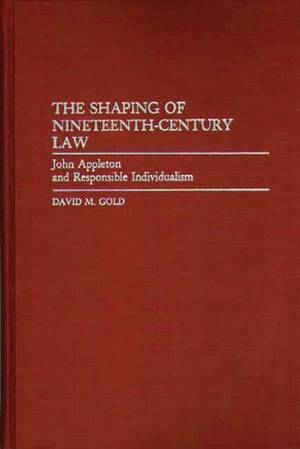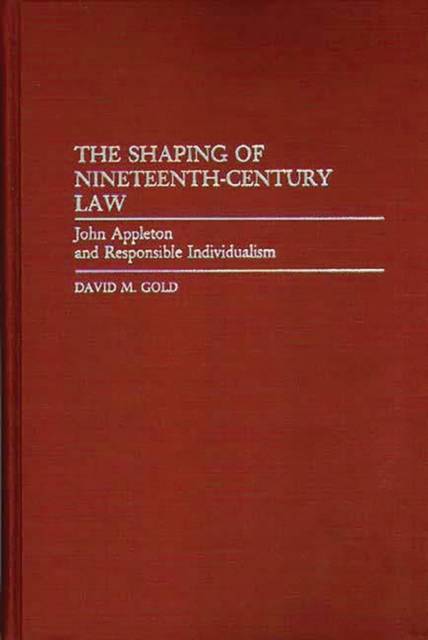
- Retrait gratuit dans votre magasin Club
- 7.000.000 titres dans notre catalogue
- Payer en toute sécurité
- Toujours un magasin près de chez vous
- Retrait gratuit dans votre magasin Club
- 7.000.0000 titres dans notre catalogue
- Payer en toute sécurité
- Toujours un magasin près de chez vous
Description
John Appleton was a prominent American lawyer who practiced in and around Bangor, Maine, beginning in the early 1820s and earned a national reputation as Chief Justice of Maine's supreme court. Through a study of Appleton's life and thought, Gold shows how the commitment to individual liberty and personal responsibility helped shape nineteenth-century American law. By tracing Appleton's life and law practice, the book addresses an aspect of early American culture that has received little attention--the nature of American individualism as embodied in the law. The book contributes to American legal historiography in other ways. It is one of just a handful of serious studies of state judges. It adds to the current revisionist interpretation of laissez-faire constitutionalism. Finally, it sheds light on some little studied areas of legal history, in particular the history of the law of evidence.
Recently some historians have recognized that law in the nineteenth century incorporated broadly held social values or world-views, and a few have written on the relationship between law and individualism. Gold contends these scholars have associated American individualism with self-reliance in the nineteenth century and nonconformity in the twentieth. Gold shows there is another side to individualism with self-reliance in the nineteenth century and nonconformity in the twentieth. Americans lived in society, therefore, their relations with one another had to be ordered. While they believed in freedom of action, they also believed that individuals had to be responsible for the effects of their actions on others. The book is ideal reading for all students of American legal history in particular and American history in general.Spécifications
Parties prenantes
- Auteur(s) :
- Editeur:
Contenu
- Nombre de pages :
- 248
- Langue:
- Anglais
- Collection :
Caractéristiques
- EAN:
- 9780313273407
- Date de parution :
- 27-06-90
- Format:
- Livre relié
- Format numérique:
- Genaaid
- Dimensions :
- 163 mm x 244 mm
- Poids :
- 571 g

Les avis
Nous publions uniquement les avis qui respectent les conditions requises. Consultez nos conditions pour les avis.






